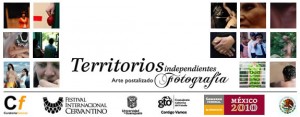TERRITORIOS INDEPENDIENTES
Festival Internacional Cervantino
Guanajuato, México
octubre – noviembre 2010
visite el sitio web
Curatoría / Curatorship:
Jorge Sepúlveda T.
Ilze Petroni
Artistas / Artists :
Roly Arias, Florencia Blanco, Judith Le Roux,
Azucena Losana, Verónica Meloni, Guadalupe
Miles, Javier Soria Vázquez, Hernán Ulm.
| Desde hace 200 años una promesa nos atraviesa: la idea del territorio que nos permitirá escribir esa otra historia que será nuestra historia. Que construirá otra identidad que será nuestra identidad.
Los festejos por el Bicentenario de La cuestión es que los gestos libertadores y los mitos fundacionales exceden las posibilidades efectivas de su cumplimiento. Actúan, digámoslo, más como un principio ordenador y unificante, que como un día que va a llegar. Porque esta es una promesa ambigua Las luchas materiales y simbólicas Por eso hemos traído estas fotografías: por las oscuras referencias a la historia e Porque el cuerpo es el último recurso y el soporte de toda riqueza, porque queremos creer que el cuerpo es el territorio siempre al borde de ser independizado, siempre en fuga y siempre sostenido en un discurso. Un discurso del deseo.
|
. . . . . . . . . . . . . . . . . . . . . . . . . . . . . . . . . . . . . . . . . . . . . . . . |
For the past two hundred years, we have been pierced by a promise: the idea of a territory that will enable us to write that other history, our history. That will forge another identity that will engender our identity. The celebration of the bicentennial is the celebration of this promise. A fiction created by our predecessors in order to withhold a project of emancipation, autonomy and freedom. The issue is that emancipating gests and foundational myths exceed the effective possibilities of their fullfillment. They act rather like a unifiying principle, not like something that will be effective someday. Because this is an ambiguous promise, that is made flesh in the facts. And the facts keep only a partial correlation to our love for the promise because facts are simultaneously liberating and enslaving.
We live amidst material and symbolic struggles, intertwined by different interests that condition our behaviour and our interpretations of history. Every promise is heresy, every heresy, when victorious, becomes a commandment. This is the reason why we have brought these photographs: for the obscure references to the history and the identity that we have inherited; because they are a sign ready to be adulterated, an instant that persists and repeats itself, educating us in such a way that we, once again, develope a desire for barbarism. Because the body is the last resort, the basis of every wealth, because we want to believe that the body is the territory always in the brink of independence, always on the run, always referred in our discourse. The discourse of desire. |
| Jorge Sepúlveda T. Curador Independiente / Independent Curator |
Ilze Petroni Investigadora de Arte / Art Researcher |
Colaboró en la traducción / Collaboration in the english translation: Juan Manuel Ipiña

One response
[…] This post was mentioned on Twitter by imagenesbajosospecha, Art and Travelling, Cultural Magazines, Curatoria Forense , Art Reviewer and others. Art Reviewer said: TERRITORIOS INDEPENDIENTES. Guanajuato, México / texto curatorial – curatorial text. http://bit.ly/9YSJRG […]